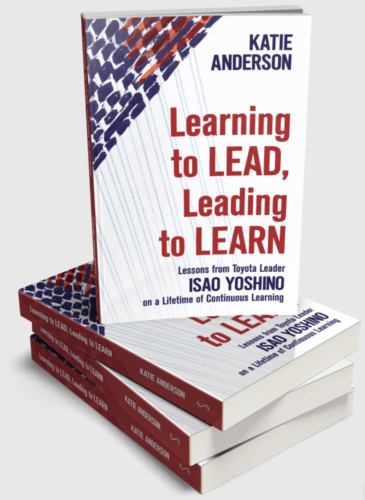
I'm looking forward to the new book by my friend Katie Anderson, due out in July:
You can now pre-order the paperback or Kindle versions.
She gave a preview of the book in her webinar that she presented hrough our KaiNexus webinar series.
Learning to Lead, Leading to Learn: Creating an Intentional People-Centered Culture
Scroll down a bit for the recording.
We recently did a short podcast to preview the session. You can listen or scroll down to read a transcript.
Recording of the Webinar:
Follow Up Q&A:
Check it out! A transcript of the podcast is coming soon and will be added here.
From her book's webpage:
THIS BOOK IS FOR YOU IF YOU…
- Are interested in becoming a more effective people-centered leader
- Currently practice Lean or continuous improvement methods in your organization
- Serve in an organizational development or leaderships role
- Want to learn more about Toyota's history and culture
- Are interested in reading some heartwarming stories about personal discovery and leadership.
Transcript of the Preview Podcast:
Mark Graban: Hi, welcome to the podcast. This is Mark Graban from KaiNexus. Today, we're doing a quick preview of our next webinar. It's going to be held May 21st at 1:00 Eastern, and it's titled “Learning to Lead, Leading to Learn — Creating an Intentional People-Centered Culture.”
You can register for it right now by going to www.kainexus.com/webinars.
We are joined today by the presenter for that session, my friend, Katie Anderson. Katie, how are you?
Katie Anderson: I'm great, Mark. How are you doing?
Mark: I'm doing all right. I'm really excited that you're going to be doing the webinar. I'm really excited about your upcoming book. We'll talk about all of that, but maybe you can first introduce yourself and tell the listeners a little bit about your background and all the things you do.
Katie: Great. I'm really excited to be talking with you and your audience, too, about the forthcoming book. Again, my name is Katie Anderson, and I'm the founder of KBJ Anderson Consulting.
I'm a Lean coach and consultant based in the San Francisco Bay area. Five years ago, I had the really special and unique opportunity to move to Tokyo, Japan for 18 months, where I met Mr. Isao Yoshino, who was a 40-year Toyota leader, and who I've become really, really good friends with since then.
Now, we're collaborating, and I am bringing forward his stories of learning and leading over his career at Toyota. It's really exciting for me to share those conversations with you and the world.
Mark: The book shares at least that main title, “Learning to Lead, Leading to Learn,” right?
Katie: Yes, it does. Learning to Lead, Leading to Learn, and it's really a book based on five years of conversations and reflections that Mr. Yoshino and I have had together about what it means to be a leader, what it means to be a learner, and creating a learning, people-centered culture.
Really, it's based on all of his stories and experiences from his time at Toyota, including some little-known pieces of history and some tidbits about being John Shook's first manager at Toyota as well.
Mark: That's both a bit of a teaser for the webinar and a bit of a teaser for the book.
Katie: Yes.
Mark: Good job. [laughs] We do want everyone to tune in for the webinar. Again, you can register at www.kainexus.com/webinars. What are some of the things that you're going to cover in the webinar on May 21st?
Katie: At the webinar, I'm looking forward to sharing some of the concepts and principles about leadership that I've known for a long time, but really came to more deeply understand through my conversations with Mr. Yoshino.
Particularly, about what a leader's role is in creating a people-centered culture and developing other people. I'm going to share some of these principles and practices, as well as some of the stories that Mr. Yoshino has shared with me, about how he learned and practiced these elements as well.
I'm going to talk to you, too, about some of the ways that I have found helpful to embody these principles and practices as a coach and a leader myself, so that you have something tangible to take away.
Not just having heard these great stories, but also, what can we do with them? We can look back in the history to learn, but it's really what do we do with that learning, and how do we create for the future? I want to offer all of those to you in our short time together.
Mark: Longer for the webinar than we have here in the podcast.
Katie: Yes.
Mark: Maybe one other thing just to touch on is the word intentional. If you could share some of your thoughts around what does that mean? Again, the subtitle for the webinar, Creating an Intentional People-Centered Culture. There'll be a lot to unpack around what is a people-centered culture, but can you share some thoughts on the word intentional?
Katie: Yes, for sure. The word intentional, or intention, is very important to me. It became even more, I guess, had a deeper meaning once I moved to Japan, and I discovered that part of the symbols for the word intention, as they're written in Japanese, come from a symbol meaning heart and a symbol meaning direction.
To me, I take this as how do we connect with what's really important inside for us? If we're wanting to develop people or create a learning organization, we need to have some awareness about that first, and that's our purpose.
Then how do we align our actions and behaviors with that purpose or the thing that's important inside? Not just having an idea about it, but having self-awareness, having a sense of purpose, and also then taking action with behaviors that are aligned with that purpose.
When we're talking about creating a people-centered culture, it's first like, “What's our purpose? What are we trying to create? What's important in that? Why is that important?” Connect with that first, but then what are the things we need to do as each individual to be able to move in that direction to create that people-centered culture?
As Mr. Yoshino says, you don't set out to create a culture, per se. You really have to set out by helping each individual person become better and better as learners and leaders as well.
Mark: When you talk about action, I guess some of that is the difference between things that are easy to say, like our people are our most important asset, or safety always comes first, but making sure that there's action. Consistent, diligent action that backs that up over time, is that a way of saying it back, maybe?
Katie: For sure. It's like how do we create the habits around being people-centered leaders, and what does that look like? We all know we should go to Gemba, go to the place that work happens.
What does that actually mean? Also, what's the reason we're doing that? Is it just to go see what's actually happening, or are we also going to show that we deeply care about people? It's that go, see, ask why, and show respect.
It's also about, how are we taking time, or making time, to learn and to reflect, and make adjustments? Part of the intentionality is, sometimes, when we're so busy, we just run from meeting to meeting, and we are more reactive, rather than proactive.
This concept of intention has an element of being proactive about it. It's being grounded and being purposeful in what we're doing, the actions we're taking, because we're trying to connect our actions with the real reason and meaning that we're trying to create.
Mark: Great. I think your intention of providing a good synopsis preview of the webinar has been achieved. Thank you for sharing today, and looking forward to what we'll all get to hear and learn from on May 21st.
Again, we've been joined here today by Katie Anderson, founder of KBJ Anderson Consulting. The webinar, again, is titled Learning to Lead, Leading to Learn — Creating an Intentional People-Centered Culture.
Katie, final thought. Where can people learn about the book, if you can point them to that on the web?
Katie: Sure, there's two places. There's the URL for the book, which is learningtoleadleadingtolearn.com. That one's pretty easy to remember. Also, if you go to my website, kbjanderson.com, there are links to the book there as well.
Mark: Great. Again, for one, Katie, thank you.
Katie: Thank you. I'm looking forward to it.
Mark: Me, too. For everybody else, again, if you want to register, go to www.kainexus.com/webinars. If you're listening to this podcast after May 21st, you'll be able to find the webinar in the webinar library on our website or on our YouTube channel. Katie, we'll talk to you in a few weeks.
Katie: Sounds great, Mark.
Please scroll down (or click) to post a comment. Connect with me on LinkedIn.
Let’s build a culture of continuous improvement and psychological safety—together. If you're a leader aiming for lasting change (not just more projects), I help organizations:
- Engage people at all levels in sustainable improvement
- Shift from fear of mistakes to learning from them
- Apply Lean thinking in practical, people-centered ways
Interested in coaching or a keynote talk? Let’s talk.









Excellent content, thanks for sharing with us all
[…] can also visit Mark’s LeanBlog post to hear a preview recording about our session and other […]